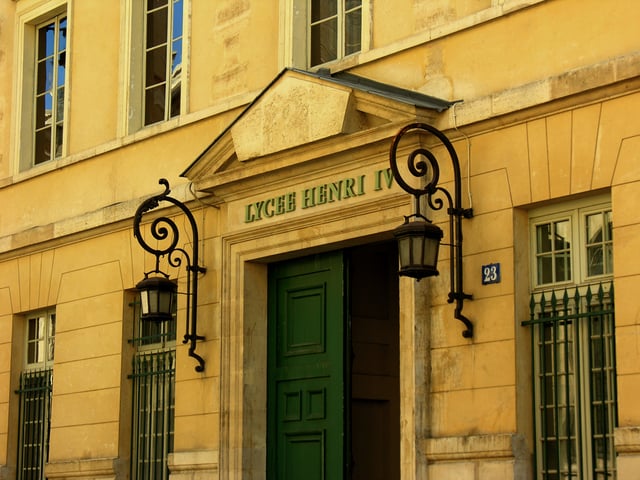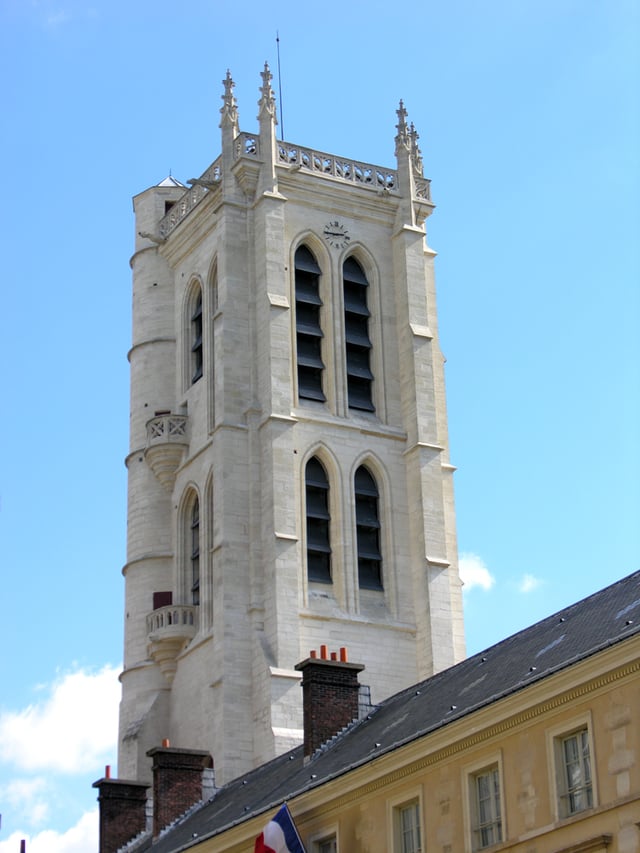Lycée Henri-IV

Lycée Henri-IV

Entrance on the rue Clovis.
The Lycée Henri-IV[1] is a public secondary school located in Paris. Along with Louis-le-Grand and Lycée Condorcet it is widely regarded as one of the most prestigious and demanding sixth-form colleges (lycées) in France.
The school has more than 2,500 students from collège (the first four years of secondary education in France) to classes préparatoires (classes to prepare students for entrance to the elite grandes écoles such as École normale supérieure, École polytechnique, Centrale Paris, Mines ParisTech, HEC Paris, among others).[1]
Its motto is "Domus Omnibus Una" ("A Home For All").
Buildings and history
Lycée Henri-IV is located in the former royal Abbey of St Genevieve, in the heart of the Latin Quarter on the left bank of the river Seine, near the Panthéon, the church Saint-Étienne-du-Mont, and the rue Mouffetard.[1] Rich in history, architecture and culture, the Latin Quarter contains France's oldest and the most prestigious educational establishments: the École Normale Supérieure, the Sorbonne, the Collège de France and the Lycée Louis-le-Grand.
The abbey was first established in 506; it flourished as a consequence of royal patronage, becoming an integral part of the Sorbonne and housing a great library.[1] The abbey was suppressed during the French Revolution, and in October 1796 the site became the first of many public schools in France.[1] The lycée's name has changed several times since its inception–École Centrale du Panthéon (1794–1804); Lycée Napoléon (1804–1815); Collège Henri IV (1815–1848); Lycée Napoléon (1848–1870) and Lycée Corneille (1870–1872)–before its current name was settled on in 1873.[1]
Today Henri-IV retains many features of the former abbey. The former abbey's library, which had the third-largest collection of books in Europe (transferred to the nearby Bibliothèque Sainte-Geneviève during the 19th century), is composed of four aisles forming a cross with a cupola in the intersection. It is one of the main features of the Lycée with its 18th-century boiseries and pavement as well as a cupola frescoed and carved by the painter Jean II Restout in the 1730s. Two aisles of the library are now used as libraries for Lycée and Classes Préparatoires levels and the two other aisles are used as rooms for conferences and exams. Another highlight is the Salle des médailles (Room of the medals), a long gallery once used as a cabinet of curiosities (a room used to display natural curiosities and artworks). It has richly decorated and carved baroque boiseries and mirrors dating back to the 18th century. The lycée's chapel dates back to the Middle Ages as does the cloister and the Clovis tower, perhaps the lycée's most famous feature. The Salle des Actes displays medieval effigies of the abbey's monks, discovered during restoration in the 1990s. The main staircase, named the escalier de la Vierge (Virgin Mary's staircase), which has a 17th-century statue of the Virgin Mary as its centrepiece, is another striking feature.[1]
Famous alumni

Lycée Henri-IV: Clovis bell tower
Eugène Albertini, epigrapher
Victor Baltard, architect[2]
Delphine Batho, politician
Guy Béart, singer
Léon Blum, French prime minister (during the Popular Front government)
Jean-Louis Bory, novelist and film critic
Jacques de Bourbon Busset, co-founder of CERN, member of the Académie française
Patrick Bruel, French singer-writer (who refers to the lycée in his song "Place des grands hommes")
Isambard Kingdom Brunel, British engineer
René Capitant, lawyer and politician
Camille Dalmais, singer
Gilles Deleuze, philosopher
Claire Dorland-Clauzel, Michelin's head of communications Verdo, Yann (14 Jun 2012), "Claire Dorland-Clauzel La bonne fée du Bibendum" [13] , Les Échos (in French), Paris, retrieved 26 Jan 2016
Esther Duflo, economist, professor at the MIT, recipient of the John Bates Clark Medal in 2010
Léon-Paul Fargue, poet
Valentin Feldman, philosopher and member of the French resistance
Michel Foucault, philosopher
Paul Fournel, writer and bicyclist
Georges Friedmann, sociologist
André Gide, writer
Julien Gracq, writer
Georges-Eugène Haussmann, baron, préfet, and city planner[2]
Alfred Jarry, writer, best known for Ubu Roi
Emmanuel Le Roy Ladurie, historian, best known for Montaillou
Claude Lefort, philosopher and political activist
Pierre Loti, sailor and writer
Emmanuel Macron, French President
Jacques Maritain, philosopher
Jean Malaurie, anthropologist, biologist and writer
Guy de Maupassant, writer
Prosper Mérimée, writer (of Carmen, for example)
Christopher Meyer, British ambassador to the United States[3]
Marius Moutet, diplomat
Alfred de Musset, playwright and poet
Paul Nizan, philosopher and writer
Henri d'Orléans, Count of Paris, pretender to the French throne
Jean d'Ormesson, novelist, fellow of the Académie française
Mazarine Pingeot, novelist and journalist, daughter of French president François Mitterrand
Plantu, cartoonist for Le Monde
Henri Pourrat, writer and anthropologist
Pierre Puvis de Chavannes, painter
Pierre Restany, art critic and cultural philosopher
Éric Rohmer, New Wave director, writer and actor
Michel Sapin, Deputy Minister of Justice from May 1991 to April 1992, Finance Minister from April 1992 to March 1993, and Minister of Civil Servants and State Reforms from March 2000 to May 2002. Current Finance Minister.[4]
Jean-Paul Sartre, philosopher
Georges Saupique, sculptor and creator of the school's war memorial
Maurice Schumann, fellow of the Académie française, minister, and senator
Jorge Semprún, Spanish Minister for culture
Bertrand Tavernier, actor, director, producer
Albert Thibaudet, essayist and critic
Fabrice Tourre, Goldman Sachs trader
Pierre Vidal-Naquet, historian
Alfred de Vigny, poet
André Vingt-Trois, Cardinal, current Archbishop of Paris
Simone Weil, philosopher
Laurent Wauquiez, former French Minister of Higher Education and Research
Jean Yoyotte, Egyptologist[5]
Stella Jang, Singer - Songwriter
Famous teachers
Henri Bergson, philosopher
Étienne Borne, philosopher
Jean-Louis Bory, novelist and film critic
Émile Auguste Chartier, philosopher
Georges Cuvier, naturalist and zoologist
Georges Pompidou, French president
See also
Secondary education in France
Education in France